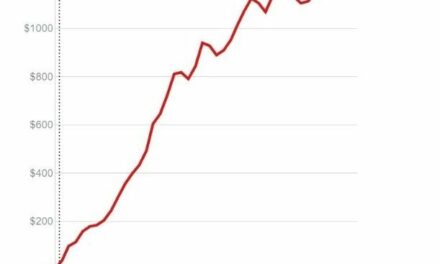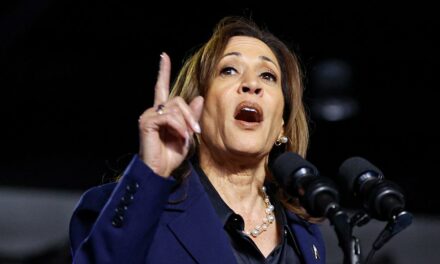We support our Publishers and Content Creators. You can view this story on their website by CLICKING HERE.
Bread crumbs in the polls may point to a likely victory by Donald Trump over Kamala Harris in the swing state of Michigan, nationally known pollster Steve Mitchell says.
“There’s been a major realignment in Michigan and national politics, with former Democrats now becoming Republicans and former Republicans becoming Democrats,” Mitchell, president of Mitchell Research & Communications Inc., told The Daily Signal.
One of the most hotly contested swing states, Michigan may determine the outcome of the 2024 presidential election. Voters have eight choices for president on the Nov. 5 ballot, including former President Trump, Vice President Harris, independent Robert F. Kennedy Jr., Green Party candidate Jill Stein, and libertarian Chase Oliver.
In the eight-way race, Trump and Harris are in a dead heat in the polls. In a two-way race, which isn’t what is on the Michigan ballot, Trump has a one-point lead over Harris, according to Mitchell’s latest poll.
But, Mitchell said, polls about voters’ support for Trump can be skewed because “shy” voters won’t admit they’re voting for him, even through online polling platform SurveyMonkey.
One way to get around that hesitancy, he said, is to ask for whom most of the person’s “friends and neighbors” are voting.
“When we asked that question, by a 10-point margin, 46-36%, voters said that their friends and neighbors were voting for Donald Trump,” said Mitchell, who is not related to this correspondent. “That’s an indication that Trump may win Michigan, or is doing better in Michigan than the poll results.”
Trump’s jump in support from members of labor unions marks a massive change in this realignment of voters, Mitchell said.
Although Trump was trailing Harris by about three percentage points in nonunion households, to which about three-quarters of Michiganders belong, Trump was up eight points in union households, according to an Oct. 16 poll by Mitchell Research & Communications, Inc.
Mitchell’s survey was conducted Oct. 14 by text-messaging registered voters randomly selected from a list of cell phones and directing them to a SurveyMonkey poll. The margin of error is plus or minus 4.04 percentage points.
Voters said Trump was the most likely candidate to solve their biggest problem, the poll found.
In that question, by a margin of 3%, respondents chose Trump over Harris.
Meanwhile, 64% of Michigan voters surveyed said they think America is on the wrong track, spelling trouble for the party in power.
“Chances are the incumbent who’s got those numbers is going to lose,” Mitchell said.
Polls have stacked a slow progression toward Trump in the seven swing states, according to RealClearPolitics averages, he noted.
“Trump is ahead in all seven battleground states right now, by very narrow margins,” Mitchell said. “But nevertheless, as slowly and as incrementally as the lead has grown, it has grown. It’s gone in one direction only, and that is toward Trump.”
Betting markets have switched from favoring Harris to favoring Trump, as have predictions from those who use algorithms to run simulations of the election, he said.
Mitchell said he wouldn’t be surprised if the election results in Michigan are unknown until midday Nov. 6 because of how close the Harris-Trump contest will be.
He predicted that Trump would appear to be winning by a landslide at midnight, before absentee ballot counts are ready. This is because more Republicans vote in person, more Democrats vote by mail, and in-person ballots are quickest to count.
“Trump is going to be way ahead, then Detroit is going to come in at the end of the night and dump a couple 100,000 votes toward Harris, and all of a sudden, a race that showed Trump winning by 3 or 4 or 5% is going to be very, very tight at the end,” Mitchell said. “That’s just the way it’s going to be, because Democrats vote early, Republicans vote on Election Day.”
Proof that Michigan’s election system is honest, Mitchell said, is that Trump won the state over Hillary Clinton in 2016 by about the same number of votes that he got in 2020, when he lost narrowly to Joe Biden.
“The only difference between the two years is [that] in 2020, Trump got 5,000 more votes than he did in 2016. So he actually did better,” Mitchell said. “But everybody thinks it was stolen because the votes came in late.”

 Conservative
Conservative  Search
Search Trending
Trending Current News
Current News 





